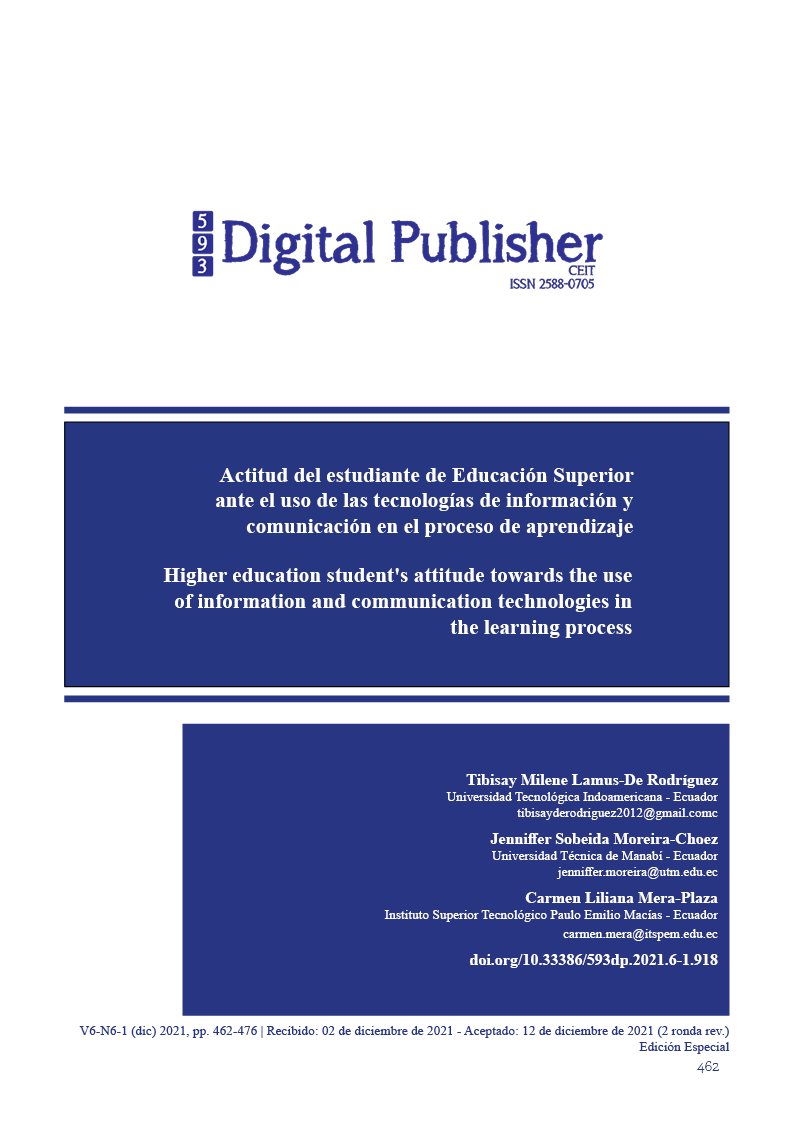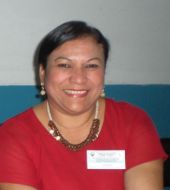Higher education student's attitude towards the use of information and communication technologies in the learning process
Main Article Content
Abstract
The purpose of this research was to understand the attitude of the university student in the use of information and communication technologies in the learning process of the Paulo Emilio Macías Higher Technological Institute. It is based on the interpretive paradigm with an epistemic ethnographic tradition, which consists of the observation, internationalization and interpretation of the reality that develops in the classroom environment. The techniques used were participant observation, narrative recording, and interviewing information recorded in field notes and technological resources. The validation of the research was carried out through internal validity and the analysis was carried out through the categorization and triangulation of the information, obtaining that there are shortcomings in technological skills and a lack of use of technologies in learning spaces in the university, a favorable attitude of the students is visualized in the face of technological innovation, since it is an educational support since it strengthens the investigation by offering extensive educational material, it strengthens the study by facilitating learning. For this reason, the teacher must assume their technological role overcoming the lack of digital skills, as well as the lack of provision of the resource in the spaces to promote its use for educational purposes in the university.
Downloads
Article Details

This work is licensed under a Creative Commons Attribution-NonCommercial-ShareAlike 4.0 International License.
1. Derechos de autor
Las obras que se publican en 593 Digital Publisher CEIT están sujetas a los siguientes términos:
1.1. 593 Digital Publisher CEIT, conserva los derechos patrimoniales (copyright) de las obras publicadas, favorece y permite la reutilización de las mismas bajo la licencia Licencia Creative Commons 4.0 de Reconocimiento-NoComercial-CompartirIgual 4.0, por lo cual se pueden copiar, usar, difundir, transmitir y exponer públicamente, siempre que:
1.1.a. Se cite la autoría y fuente original de su publicación (revista, editorial, URL).
1.1.b. No se usen para fines comerciales u onerosos.
1.1.c. Se mencione la existencia y especificaciones de esta licencia de uso.
References
Befani, B., & Stedman-Bryce, G. (2016). Process Tracing and Bayesian Updating for impact evaluation: Http://Dx.Doi.Org/10.1177/1356389016654584, 23(1), 42–60. https://doi.org/10.1177/1356389016654584
Bullones García, M. C., Vivas Cortez, M. J., & Caseres, E. (2015). Actitud de los estudiantes frente al uso de tecnologías educativas para el aprendizaje de la matemática: una visión desde los estudiantes de ingeniería de la Universidad Centroccidental “Lisandro Alvarado.” Revista Educación En Ingeniería, 10(20), 143–153. https://doi.org/10.26507/REI.V10N20.592
Carrera, R. M. H. (2014). La investigación cualitativa a través de entrevistas: su análisis mediante la teoría fundamentada. Cuestiones Pedagógicas, 23, 187–210.
Charres, H., Villalaz, J., & Martñinez, J. (2018). Triangulación: Una herramienta adecuada para las investigaciones en las ciencias administrativas y contables. FrecoSapiens, 1(1). http://portal.amelica.org/ameli/jatsRepo/221/2211026002/html/
Cypress, B. S. (2017). Rigor or reliability and validity in qualitative research: Perspectives, strategies, reconceptualization, and recommendations. Dimensions of Critical Care Nursing, 36(4). https://doi.org/10.1097/DCC.0000000000000253
De Pelekais, C., El Kadi, O., Seijo, C., & Neuman, N. (2015). El abc de la investigación. Pauta pedagógica (Séptima ed). Ediciones Astro Data S.A.
García Sánchez, M. del R., Reyes Añorve, J., & Godínez Alarcón, G. (2018). Las Tic en la educación superior, innovaciones y retos. RICSH Revista Iberoamericana de Las Ciencias Sociales y Humanísticas, 6(12).
Getz, J. &. Lecompte, M. (1988). Etnografía y diseño cualitativo en investigación educativa. Madrid, España: Morata.
Guber, R. (2001). La etnografía método, campo y reflexividad (G. E. Norma (ed.)).
Hennink, M. M., Kaiser, B. N., & Weber, M. B. (2019). What Influences Saturation? Estimating Sample Sizes in Focus Group Research. 29, 1483–1496. https://doi.org/10.1177/1049732318821692
Hernández Salazar, P. (2010). Investigación bibliotecológica. In Investigación bibliotecológica (Vol. 24, Issue 51). Universidad Nacional Autónoma de México, Instituto de Investigaciones Bibliotecológicas y de la Información. http://www.scielo.org.mx/scielo.php?script=sci_arttext&pid=S0187-358X2010000200001&lng=es&nrm=iso&tlng=es
Marín, A., Hernández, E., & Flores, J. (2016). Metodología para el análisis de datos cualitativos en investigaciones orientadas al aprovechamiento de fuentes renovables de energía. Revista Arbitrada Interdisciplinaria Koinonía, ISSN-e 2542-3088, Vol. 1, No. 1 (Enero - Junio), 2016, Págs. 60-75, 1(1), 60–75. https://dialnet.unirioja.es/servlet/articulo?codigo=7062638&info=resumen&idioma=SPA
Marín Olán, P. (2018). Emerging Trends in Education Volumen 1, número 1 Diciembre. https://doi.org/10.19136/etie.a1n1.2803
Martínez, M. (2004). Ciencia y arte en la metodología cualitativa. ISBN 968-24-7011-0. México, D.F. Distrito Federal: Trillas, S.A ed C.V.
Moral, G. del, Suárez-Relinque, C., Moral, G. del, & Suárez-Relinque, C. (2020). La categorización familiar como técnica de apoyo al proceso de análisis que sigue la teoría fundamentada. Gaceta Sanitaria, 34(1), 87–90. https://doi.org/10.1016/J.GACETA.2018.09.007
Moreira-Choez, J. S., Mera-Plaza, C. L., & Vera-Anzules, F. E. (2021). Objetos virtuales de aprendizaje como estrategia didáctica de enseñanza aprendizaje en la educación superior. Dominio de Las Ciencias, 7(3), 926–934. https://doi.org/10.23857/DC.V7I3.2064
Moreira Choez, J. S., Delgado Cedeño, L. A., Mendoza Vélez, M. E., & Delgado Cedeño, M. P. (2021). Online Learning Objects in higher education, an alternative in times of pandemic. Turkish Journal of Computer and Mathematics Education (TURCOMAT), 12(14), 3156–3165. https://www.turcomat.org/index.php/turkbilmat/article/view/10882
Moreno, R. (2017). Actitud del estudiante universitario ante el uso de las tecnologías de información y comunicación en el proceso de enseñanza aprendizaje. Tesis en prensa en opción al Grado de Magíster Scientiarum en Docencia para Educación Supertior. Santa Ana de Coro, estado Falcón. Venezuela: Universidad Nacional Experimental “Rafael María Baralt”.
Morse, J. M. (2015). “Data were saturated . . . “. Qualitative Health Research, 25(5), 587–588. https://doi.org/10.1177/1049732315576699
Piñeiro Aguiar, E. (2015). Observación participante: una introducción. Revista San Gregorio, 0(0), 80–89. https://doi.org/10.36097/RSAN.V0I0.116.G72
Ramos Ramírez, L. (2017). Etnografía concéntrica y didáctica Notas para no-antropólogos. Revista de Ciencias Sociales y Humanidades, 28, 75–89. https://doi.org/10.20983/noesis.2017.2.4
Rodríguez-García, D., & Pino-Juste, M. (2019). La entrevista como método cualitativo. Un estudio de caso etnográfico a través de esta herramienta. CIAIQ2019, 3, 603–611. https://www.proceedings.ciaiq.org/index.php/CIAIQ2019/article/view/2402
Sierra Llorente, J., Bueno Giraldo, I., & Monroy Toro, S. (2016). Análisis del uso de las tecnologías TIC por parte de los docentes de las Instituciones educativas de la ciudad de Riohacha. Omnia, 22(2). https://www.redalyc.org/journal/737/73749821005/html/
Torillo, D. (2016). El grupo de discusión: la experiencia de la realización de grupos en barrios periféricos del Gran La Plata. In Técnicas y esTraTegias en la invesTigación cualiTaTiva (Primera ed, pp. 55–66). Editorial de la Universida de la Plata.
Yuni, J. ., & Urbano, C. . (2014). Técnicas para investigar: recursos metodológicos para la preparación de proyectos. In V 1 (p. 120). Editorial Brujas. www.editorialbrujas.com.ar




